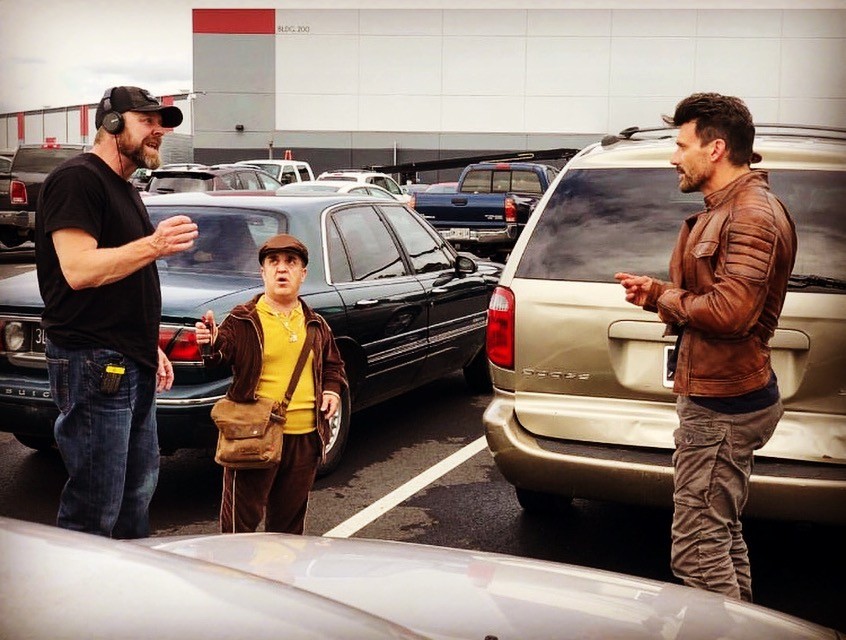We’re excited to introduce you to the always interesting and insightful Aaron Beelner. We hope you’ll enjoy our conversation with Aaron below.
Aaron, appreciate you joining us today. Coming up with the idea is so exciting, but then comes the hard part – executing. Too often the media ignores the execution part and goes from idea to success, skipping over the nitty, gritty details of executing in the early days. We think that’s a disservice both to the entrepreneurs who built something amazing as well as the public who isn’t getting a realistic picture of what it takes to succeed. So, we’d really appreciate if you could open up about your execution story – how did you go from idea to execution?
Rose Bucket Productions was a concept long before I was truly aware of what was taking place. My late father had coined his own phrase, “pulling a rose out of a bucket of s@%t,” and he had used this unique expression on two occasions. On the day my mother passed, August 3, 2009, he was crumbling, and he looked at me and asked, “You know how you have a way of pulling a rose out of a bucket of s@%t? Do you think you could do that today?” It was from this very moment, I decided to start my own production company and the name would be “Rose Bucket Productions.” The company was incorporated in 2011. The progression has been snail-like until this year. Alongside Mann Robinson Studios (Atlanta), Rose Bucket Productions is moving full stride into 2024 with 19 productions.
I have been creating and writing screenplays and series since 2011. There are 12 years of new projects waiting to be produced. My main goal has always been to promote awareness for the disability community. I am a man with achondroplasia (dwarfism), and I believe I am responsible for advocating for those who deserve better representation in the entertainment industry.


Awesome – so before we get into the rest of our questions, can you briefly introduce yourself to our readers.
My original intention was to pursue a business degree. I didn’t see myself as a performer, nor a part of the entertainment world. I was 13 when I received my first check for performing. I performed during high school and undergraduate studies. I spent two years, 2000 and 2001, on tour with Radio City performing for The Radio City Christmas Spectacular. I decided to apply for graduate school in order to hone my craft. I completed the M.F.A. in Performance at the University of Georgia in 2005. It wasn’t until graduate school that I realized my writing ability was substantial. By my second year at U.G.A., I was auditioning and working in Atlanta. I decided to continue working in Atlanta after graduation. Alongside of performance, I was teaching acting to new students seeking a one to one environment. I continued writing random pieces to set what could “get some legs” as they say in the industry. As an instructor, it’s my duty to help my students find the forces and intuition to bring characters to life. As a man with achondroplasia (dwarfism), I believe I provide a unique perspective, and I wanted to build an entity to pursue including competent and talented performers with disabilities. In the spring of 2011, Rose Bucket Productions was formed with hopes of representing the disable community on a much greater scale. Last year, the production company started to gain steam. Alongside Mann Robinson Studios (Atlanta), Rose Bucket Productions is gearing up for production and distribution of three of its seven productions slated to be finished by 2027. It all started with The Little Tin Man starring Kay Cannon, Jeff Hiller, and Chris Henry Coffey. Dugan Bridges created this wonderful narrative about a little person trying to break out of the mold of typecasting. I will have to admit I am most proud of The Little Tin Man. This was a feature with a shoe string budget shot in Harlem, NY, in only 18 days. It was a lesson on life and has instilled relentless perseverance in me.


We’d love to hear a story of resilience from your journey.
We had the opportunity or great misfortune, depending on who you ask, to shoot a feature length independent film in NYC during the spring of 2012. It was a strict budget of $120,000 and 18 days. Dugan Bridges had created a concept where the leading man was played by a person with dwarfism. The days were strenuous with 18 hours being the standard. The first and second assistant directors quit after 48 hours. We lost one of our locations on the first day of filming which cost us seven hours. The production team was held together by threads, and, yet, the film earned invitations to 13 film festivals and an exclusive initial release with Time Warner Cable before opening on numerous streaming formats. It was a constant uphill battle from the original pitch to the premiere, and I will always see it as the truest test of perseverance in my career.


What’s a lesson you had to unlearn and what’s the backstory?
At the risk of appearing to be the ultimate pessimist, I have reprogrammed my thought process as to whom I trust. In this industry there are very few who can actually accomplish what they promise. I think the theme of The Little Red Hen should be the mantra for the entertainment world. It clearly is not. Unfortunately, it took a lot longer than it should to arrive at this realization.




